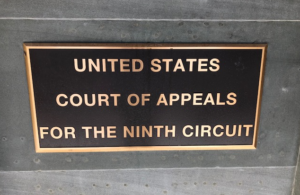Ninth Circuit Trends In Certifying State Law Questions
With the Supreme Court highlighting the helpfulness of using state court certification procedures, the number of certified state law issues is only likely to increase.

The U.S. Court of Appeals for the Ninth Circuit (photo by David Lat).
Ed. note: This article first appeared on The Juris Lab, a forum where “data analytics meets the law.”
This Term, the U.S. Supreme Court highlighted the importance of federal courts certifying novel, determinative issues of state law in federal appeals to the relevant state supreme court, rather than deciding those issues themselves.
In a per curiam order in Mckesson v. Doe, 592 U.S. __ (2020), the Court granted a petition for certiorari and remanded the case to the Fifth Circuit for the circuit to certify a novel issue of state law, on which the federal constitutional analysis in the case depended, to the Louisiana Supreme Court.
The case arose from injuries sustained by a police officer during a Black Lives Matter protest. The appellate panel overturned the dismissal of a negligence claim brought against the organizer of the protest. The Circuit deadlocked on a petition for rehearing, parting ways on both the constitutional issue and the panel decision’s interpretation of state law. The question presented to the Supreme Court was whether the theory of personal liability adopted by the Fifth Circuit violated the First Amendment.
The Court determined that “the Fifth Circuit’s interpretation of state law [was] too uncertain a premise on which to address the [constitutional] question presented” in the petition because that issue was “implicated only if Louisiana law permits recovery under these circumstances in the first place.” Order at 3.
The Court observed that the Louisiana Supreme Court Rules allowed federal courts of appeals to seek guidance on novel issues of state law, and concluded that the Fifth Circuit should have done so in this case for two reasons: (1) “the dispute present[ed] novel issues of state law peculiarly calling for the exercise of judgment by the state courts” and (2) “certification would ensure that any conflict . . . between state law and the First Amendment [was] not purely hypothetical.” Order at 4. The Court ruled that “the Fifth Circuit should not have ventured into so uncertain an area of tort law — one laden with value judgments and fraught with implications for First Amendment rights — without first seeking guidance on potentially controlling Louisiana law from the Louisiana Supreme Court.” Order at 5.
The Supreme Court’s endorsement of the certification procedure in cases where novel issues of state law (particularly those involving cutting edge moral or policy issues) are at stake further underscores the importance of certification procedures in the federal courts of appeal.
In the June 4, 2021, Law360 article “When Your Ninth Circuit Case Needs California High Court Input,” we documented the increased use of the certification procedure by the Ninth Circuit with regard to the California Supreme Court.
For Juris Lab, we have further examined the data underlying our original study, to determine (1) which Ninth Circuit judges have certified more cases to the state supreme court, and whether any meaningful pattern can be discerned from that data and (2) what stage in the proceeding the Ninth Circuit has most often certified an issue, and whether it did so on its own motion or at the request of a party.
As to the members of the court most likely to certify state law issues to the California Supreme Court: Among over 47 certifications in the Ninth Circuit since 2002, the judges whose names most often appeared as members of panels seeking state high court input are Judges Fletcher (8), Gould (7), Ikuta (6), O’Scannlain (6), Paez (5), Graber (5), Callahan (4), and Silverman (4).

Half of these judges previously served as a state court judge: Paez on the Municipal Court in Los Angeles, California; Callahan on the California Court of Appeal; Graber on the Oregon Supreme Court; Silverman on the Maricopa County, Arizona Superior Court. They therefore may be particularly attuned to allowing state courts to determine novel state law policy issues themselves.
The most notable finding from our study of Ninth Circuit certifications to the California Supreme Court, however, is that only 11 of the 47 cases had issues certified by party motion; the overwhelming number of certifications were done by the Circuit sua sponte, by members of the panel, and most often after oral argument or even at the rehearing stage.

This suggests that, once the panel members conferenced after oral argument, they all agreed that the state law issues in the case were not clearly resolved by existing law, and would benefit from input by the relevant state supreme court. This also suggests that, where counsel have a Ninth Circuit appeal involving novel state law issues, they should be prepared for the possibility of certification, and develop a strategy around that.
With the U.S. Supreme Court highlighting the helpfulness of using state court certification procedures, the number of certified state law issues in the Ninth Circuit is only likely to increase.
Click here to view the data from this post.
M.C. Sungaila is the Appellate Practice Chair at the law firm Buchalter.







